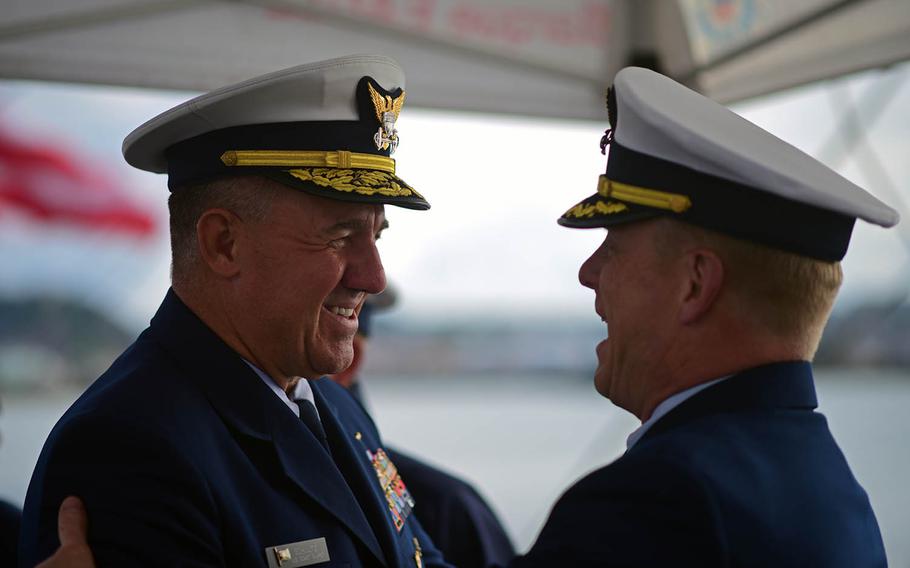
Adm. Karl Schultz, left, is greeted by Capt. Matthew Meilstrup aboard the U.S. Coast Guard tall ship Eagle on June 6, 2019. (Adam Stanton/U.S. Coast Guard)
TOKYO — The U.S. Coast Guard’s commandant is pushing for a better way to deal with island nations in the western Pacific — one designed to counter “antagonistic, aggressive behaviors” from the Chinese.
“I think what we would champion is transparent engagement,” Adm. Karl Schultz said Tuesday from Saipan during a conference call with international reporters. “I think we have seen behaviors out of the Chinese coast guard – the maritime militia – that are not consistent with the rule-based order.”
Siding with the United States in the global power competition in the Indo-Pacific region means receiving a used Coast Guard cutter. It also means assistance with everything from enforcing international fishing regulations to search-and-rescue operations and training in maritime law enforcement, Schultz said.
“I think there needs to be an international pushback to say, ‘We reject the types of behavior, the antagonistic, aggressive behaviors that are not consistent with the rule-based order,’” he said.
The commandant announced a 30-day deployment of a Juniper-class buoy tender and a fast-response cutter as part of efforts to beef up the Coast Guard presence in the Northern Marianas, a U.S. commonwealth in the western Pacific that includes Guam and Saipan. Schultz spoke as the potential for conflict in the region continues to simmer. On Friday, for example, Vietnam demanded China remove a survey vessel and coast guard ships from the Vanguard Bank, the westernmost area of the disputed Spratly Islands and site of gas and oil deposits.
Likewise, the Philippines is embroiled over what it claims are violations of its maritime territory by China. Last month, Filipino fishermen said a Chinese vessel collided with and sank their boat, leaving 22 of them stranded. A Vietnamese vessel rescued them, according to reports.
Schultz, who sidestepped strategy questions, said the U.S. has provided Vietnam, Sri Lanka and the Philippines with surplus high-endurance, 378-foot-long Hamilton-class cutters to patrol their maritime territory.
“Those are capabilities that the host nations should be able to develop and use to project their own sovereign interests in the region,” he said.
The U.S. is doing more than providing surplus material to its regional friends, Schultz added. The Coast Guard is also training and working with them.
“We are collaborating, working very diligently with the Vietnamese,” the admiral said. “We’ve worked with the Malaysians, the Indonesians, helping them build out their capacity; with the Philippines, as I’ve mentioned.”
Schultz said his goal for the Coast Guard “is to be a partner of choice in the region” that tailors its services to the needs of the nation it is supporting. Answering a reporter’s question, he said allies must meet the wave of vessels large and small that China puts to sea with a partnership and a commitment to rule of law.
The overall goal, he said, sprinkling the half-hour session with a phrase common in maritime defense circles, is a “free and open Indo-Pacific,” meaning one absent limits imposed by China as it seeks to expand its sphere of influence.
Schultz was clear on his belief that the U.S. is more than a supporting player. He sees “clear indicators” that the “Chinese are operating in the region” that includes the Northern Marianas and in a partner state, the Federated States of Micronesia. He did not specify those indicators.
“That is a factual finding,” he said. “Sitting on the ground in Saipan today you can see clear indicators of influence in the region, financial interest in the region. I think what we’re looking at with some of the island nations, the partners, is to be a partner of choice, to offer the exchange of capabilities and professional exchanges with the regional partners.”
Schutz said the Coast Guard will soon station a buoy tender and a patrol boat in American Samoa for an extended period as a “proof of concept.”
Buoy tenders are 225-foot-long vessels that, despite the name, are multi-mission ships in addition to maintaining navigational buoys, according to the Coast Guard website. Schultz said he foresees the patrol concept expanding to include widespread cooperation by other countries to circumvent Chinese influence.
“I anticipate that mothership-type operation with some patrol boats, maybe trying to lash up with some Australian partners and New Zealand partners in the region, Japanese partners, really that international face that offers an alternative to other actors in the region,” he said.
In the next three years, the Coast Guard also plans on stationing three Sentinel-class, fast response cutters in Guam, he said.
Schultz said the U.S. Coast Guard cutter Stratton is taking up the station in the western Pacific previously occupied by the cutter Bertholf.
During its six-month deployment, the Bertholf, under the control of the Japan-based 7th Fleet, transited the Taiwan Strait with a U.S. guided-missile destroyer, becoming the first cutter to make that passage. It also took part in exercises with the Philippine coast guard in the South China Sea and enforced sanctions against illicit ship-to-ship transfers of commodities like coal bound for North Korea.
The Stratton, which is a National Security cutter like the Bertholf, will carry out the same mission, Schultz said.
ditzler.joseph@stripes.com Twitter: @JosephDitzler